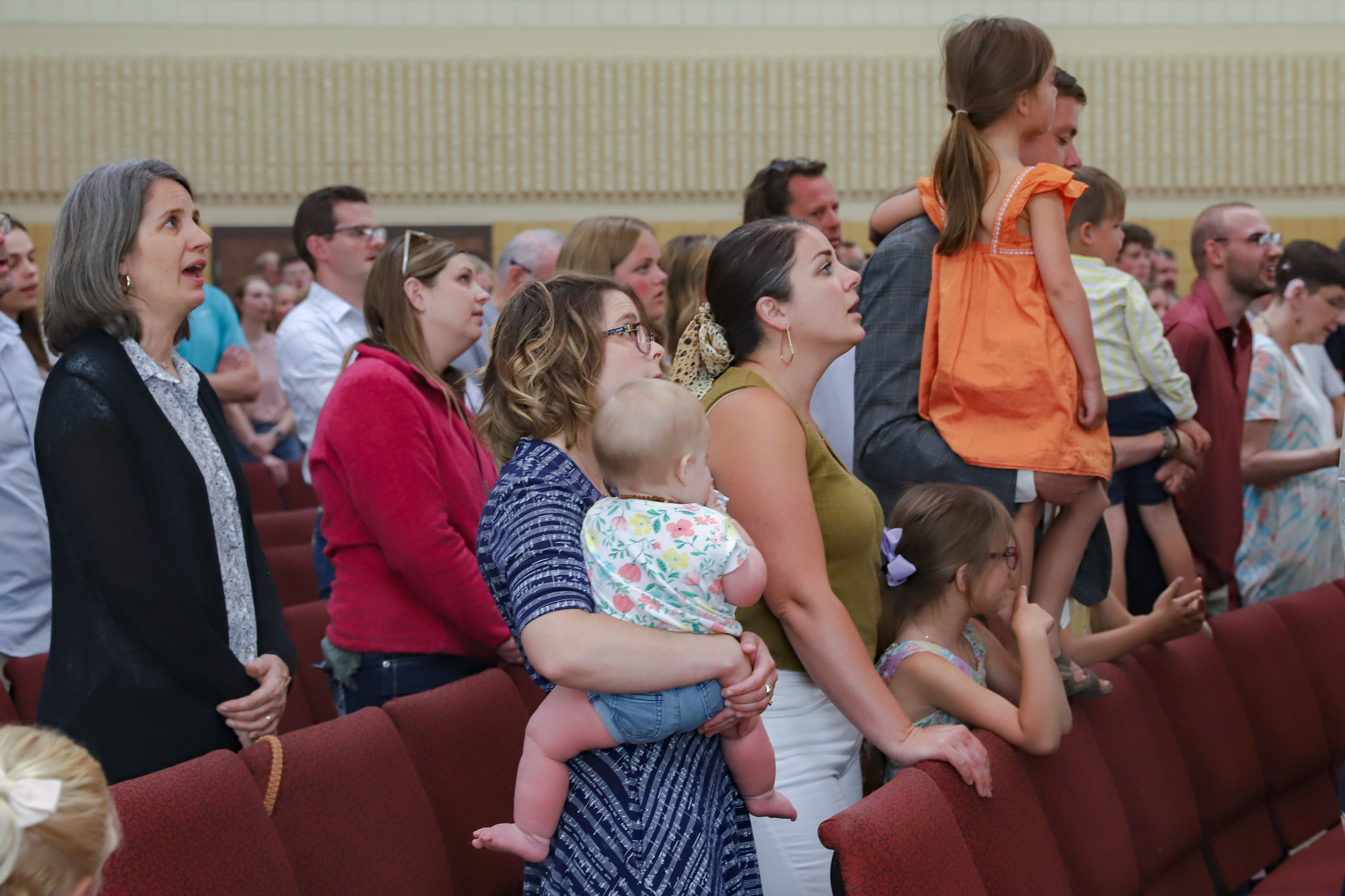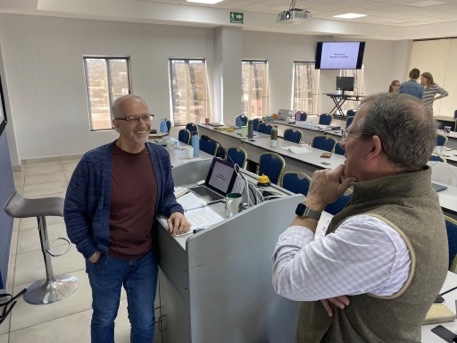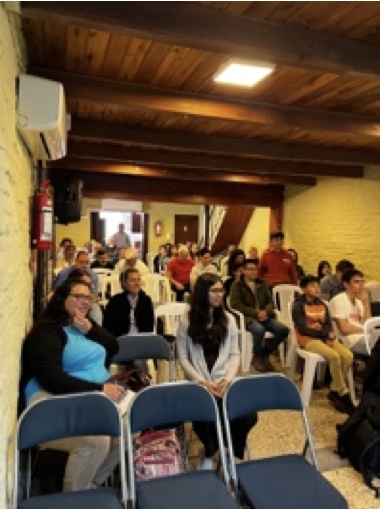By now you know that Harvest Church is hosting a special conference this spring called “Caring for One Another” (Friday-Saturday, April 21-22), featuring Dr. Ed Welch. Perhaps you’ve wondered, “Why should I attend this conference?” Great question! Here’s offering several reasons for your prayerful consideration:
- Featured Posts
- All Posts
Why Celebrate the Lord's Supper More Often?
At our April stated meeting, Harvest session voted to increase the number of times we celebrate the Lord’s Supper from once to twice per month. There is no chapter and verse in the Bible commanding how often we should celebrate this sacrament. There also isn’t a required frequency in our secondary standards (confessions, catechism or book of church order). Each local session is free to make this decision based on their conviction of what will best glorify God and edify his people.
Keep ReadingHarvest Witness Team Spring Update
After three years of work at Harvest, I’m grateful to see the way that the Lord has been growing a passion for witness and missions at our church. Here are some upcoming events we ask you to be in prayer for as we prepare for a beautiful summer!
Keep Reading
Where Do I "Fit" at Harvest?
At a large church, it’s easy to be lost in the crowds and not quite know where your friend group is or what service opportunities there might be. If you would like to share your talents and support our church before VBS this summer, you can fill out the deacons questionnaire share this week
Keep Reading
Working in Hard Places
How important is it that we work in a “Christian” environment? I want to argue that it’s less important than many of us make it out to be and I want to challenge you—if you’re working in a difficult workplace—that perhaps this is where God wants you to continue to labor.
Keep Reading
“Why Don’t We Sing More ______?”
The key is for us to appreciate our different backgrounds and preferences and joyfully sing the songs we don’t know as well or enjoy as much – in the comforting knowledge that others in the body are greatly blessed by it. The Lord not only delights in robust singing – but in the sincere love we express for one another as we sing.
Keep Reading
Update from Pastor Dale
For the Pastor’s Post this week I would like to give you all a brief update on my life. I’ve been gone for two weeks – but it feels longer than that and I am happy for the opportunity to reconnect!
Keep Reading
Goodbye to 2023
Every single thing that happened this year - in our personal life, in the church of Christ, or in the world around - happened “according to the purpose of Him who works all things according to the counsel of His will” (Eph 1:11).
Keep Reading
Thoughts Following the Christmas Program
The Christmas program this past Sunday evening was a delightful reminder to me of the goodness of God revealed in the wonder of children. I
Keep Reading
Mission Week
These past few days have been very rewarding. I’m in southern California for Home Missions Board meetings and I’ve told several people that this has been the most enjoyable Home Missions meeting I’ve ever attended (and I’ve been on the Board for 16 years).
Keep Reading
Why I Give Thanks for You in 2023!
Following in the pattern of Paul and John, I have to say “thank you” to God for the grace that I see at work in the lives of Harvest members.
Keep Reading
Why I Am Excited about Harvest Church
Friends, I’m excited to think about what the Lord might do, by His power and for His glory, among and through us, as we continue to grow in intentional discipleship, missional outreach, and church planting. I believe that Harvest’s best days are yet to come – and that’s very exciting.
Keep Reading
Thoughts on Missions and Montevideo
My lasting impression of Montevideo is the tremendous need for the gospel there.
Keep Reading
Blessed to be a Blessing
What does evangelism look like? How do we know we are being faithful to the great commission when Jesus called us to go into all the world and make disciples?
Keep Reading
We're Back
Well, we’re back! For those of you we haven’t met yet, my name is Brennen Winter, and I am going to be Harvest’s full-time intern for the coming year. I am joined by my extraordinary wife, Tiffany, and our timid but lovable dog, Winchester (“Winnie”). We have many interests (just ask) and are so excited to be back in West Michigan and at Harvest in particular.
Keep Reading
A Parable From the Front Lawn
Being in loving and committed Christian community creates opportunities for people to give verbal recognition to the work that God has done in us. We are putting ourselves in positions where God can speak through his people to remind us: God is slowly and surely making us to look more like Christ. And hopefully we can do the same for others.
Keep ReadingCatch Them Doing Something Good
As you consider this triad of biblical categories—“saint, sufferer, and sinner”—which of these lenses tends to control the way you see and speak to God’s people around you? Each of these perspectives on our Christian experience is obviously important, but my sense is that—dare I say it?—our conversations with one another often suffer from a grave imbalance: “sinner” gets the most airtime, “sufferer” runs a distant second, and “saint” gets little to no mention at all.
Keep ReadingLet Me Tell You About My Brother
This past Monday my family (brothers and sisters) got together for Mom’s 83rd birthday. It was a perfect summer night for a back yard buffet – and one more chance to be with my brother Randy. A highlight of the evening was sharing stories and memories of Randy; things we particularly loved about him. It was a blessing to be able to do that with him there, to listen and join in. It was evident that Randy is a unique blessing to our family. Always has been.
Keep ReadingPastoral Intern Update
The kindness of God has been made manifest in so many ways these last two years. We’ve come back to West Michigan, for a brief time, to be of service to the saints at Harvest.
Keep ReadingHome and Post-Vacation Blues
Many people experience PVB because they hate their job or their ‘normal’ life. That’s not the case for me at all. I love my work and I feel incredibly blessed in my normal life. It’s just not home – not in that deep sense. Normal life, in this present evil age with a not-yet-perfected self, is a life filled with stress, conflict, loss, fear, weariness, anxiety, etc. Normal work is filled with thorns and thistles – and something deep within me longs for beauty and for deep body and soul rest. That’s why I cry a little when I must leave the place where I experience a taste of it. It feels like leaving what I was made for.
Keep ReadingSummer Memory Challenge
Scripture memory, however, whether it be for adults or kids, is not something we do just for kicks or to gain some religious points. Scripture memory is about worship, holiness, ministry, and mission. L
Keep ReadingFaithfulness and Pride Month
The month of June is upon us and, with it, the celebration of America’s true public religion – Pride. Our nation, with much of the western world, has committed itself wholesale to the worship of unlimited sexual license and the aggressive evangelizing of the LGTBQ+ agenda. This is not about politics, or social policy, or human rights. At its core, this is purely about worship. It is demonically driven rebellion against the Living God and His good creation. This is man “exchanging the truth of God for a lie” and God, in judicial response, giving our society “over to a debased mind to do what ought not to be done” (Romans 1:28). Pride Month is man shaking his fist in the face of God – and God revealing His just and awful response to that wicked pride.
Keep ReadingWelcome, Mercado Family!
This coming week we welcome Eddie Mercado as Harvest’s full-time, summer pastoral intern. Eddie and his wife Hilary have 4 children: Calvin (9), Ezekiel (7), David (5) and Amelia (3). He was raised in a Christian home in the greater Chicago area, but did not become convicted of his sin and trust in Christ until he was 12-13 years old. In 2016, he and his family began attending Harvest’s evening service while Eddie studied at Kuiper College. The Mercados officially joined Harvest as members in 2020.
Keep ReadingAnxious for Nothing
We are people who worry. We worry about our health, about the kids, about our job, about our relationships, the economy, the country, the world. I, for one, am an expert worrier. I can find something to worry about in just about any situation, no matter how good it might be.
Keep ReadingThoughts on a Perfect Spring Morning
Spring is nearly too much for me. The sheer thrill of warm sunshine, the wonder of growing things, the glory of flowering trees and the smell of warm earth; I can barely contain myself. I feel like a 5-year-old boy on my birthday about to open the presents with cake and ice cream waiting. It’s too good and too much, an overload of the joy-capacitor. The weight of the glory strains what this mortal can handle. I can’t help but think that this experience is a small foretaste of the first day in heaven.
Keep ReadingWow! ESL Ministry Praise
Why are we taking on this new task of offering English as a Second Language classes? The purpose of ESL ministry is to share the Good News of Christ in word and deed. In Matthew 25, Jesus describes some of the characteristics of his people. These good deeds are not the basis of their salvation, but the evidence or demonstration of it: “The King will say to those on his right, ‘Come, you who are blessed by my Father, inherit the kingdom prepared for you from the foundation of the world. For I was hungry and you gave me food, I was thirsty and you gave me drink, I was a stranger and you welcomed me…”
Keep ReadingHow Beautiful Is the Body of Christ
Have you noticed how the Apostle Paul repeatedly references multiple associates—“fellow workers” and “ministers”—with whom he serves. As Colin Marshall and Tony Payne observe, “Up to 100 names are associated with Paul in the New Testament, of which around 36 could be considered close partners and fellow laborers.” [2] For example, there are Prisca and Aquila (Rom 16:3), Apollos (1 Cor 3:5), Tychichus (Eph 6:21), Epaphroditus (Phil 2:25), Epaphras (Col 1:7), and Timothy (1 Thess 3:2), to name just a few. In a word, Paul carried out his ministry within the context of a team.
Keep ReadingRadical Gentleness
I’m convicted by how easily contemporary Christians (me included) act like these fruits are nice-but-not-necessary features of the Christian life. We can all recite them, but how many of us intentionally pursue them? How many of us are deeply conscience stricken when they are not evident in our life? I know some of us are, and I’m deeply thankful for you. But, I feel like my vision of piety has been heavy in how-to-respond-to-God and insufficiently focused on the fruit of the Spirit – which is heavy in how we respond to people.
Keep ReadingThe Incredible Blessing of the Bible in this Dark World
“Thy word is a lamp unto my feet, a light upon my path.” That’s how I memorized Psalm 119:105 as a young boy at Lamont Christian School. It’s hard to describe how much more precious that truth has become 50-some years later. I say that because I feel increasingly disoriented in today’s society. So much has changed.
Keep ReadingAn Easter Conspiracy!
Conspiracy theories have a way of grabbing our attention. Joe Carter defines a conspiracy as something that “…explains an event or set of circumstances as the result of a secret plot, usually by powerful conspirators.” Whether it’s a fake moon landing, flat-earthers, the illuminati, or the reptilian elite (yes, you read that correctly), there is something simultaneously sensational, humorous, and pathetic about these claims.
Keep ReadingPrayers for Nashville
Like yours, my heart has been heavy with grief this week in the wake of the evil suffered by Christians in Nashville. And, perhaps like yours, my heart has struggled to find words to speak to God in prayer.
Keep ReadingHelp! Take the 9-1-1 Summer Challenge!
Have you ever dialed 9-1-1? I will always remember, in vivid detail, the night our middle daughter had a febrile seizure. She had a spiking fever, convulsions shook her little body, and her eyes went blank as she dribbled saliva and vomit out of her mouth. Our world fell apart. We thought for sure we were losing our baby girl.
Keep ReadingThe Power of Culture
I read a book on my most recent study break that has really gotten my attention. I’ve begun sharing it with the staff here, and hope to do the same with the Session. It’s not a “Christian” book – but it applies directly and powerfully to how we live together, as followers of Christ, in our families and our church.
Keep ReadingWhy Attend the ‘Caring for One Another’ Conference?
By now you know that Harvest Church is hosting a special conference this spring called “Caring for One Another” (Friday-Saturday, April 21-22), featuring Dr. Ed Welch. Perhaps you’ve wondered, “Why should I attend this conference?” Great question! Here’s offering several reasons for your prayerful consideration:
Keep ReadingBaseball: The Most Biblical Sport
Spring training tells us that baseball has arrived, but not yet in full. We get a delicious foretaste of what is coming as the sounds and sights of summer break into our winter. Similarly, for Christians, we come to experience the new age we’ve been rescued into as the Holy Spirit resides in us (Eph. 1:13-14).
Keep ReadingRekindling Lost Love
Three beautiful truths from Ephesians 3:14-21 enable us to rekindle lost love. First, love flows from all three persons of the trinity. Second, we lack power, in ourselves, to see and enjoy the majesty of God’s love. Third, when we cry out in desperation to to see God’s love for us in Christ again, we are asking the one who is actually able to answer our prayers “abundantly more than we ask or think.”
Keep ReadingFive Psalms for Grieving with Hope
As Christians, we are often uncertain how to grieve. Oftentimes, when death or other tragedy strikes, we often feel we are going “off the map” into unrecognized territory. Part of this is the way it should be. Death and sin are against the way God created the world. Grief disorients us because we are perceiving a tear in God’s good created design. But as a child, I remember being very undone by a young boy who was a member of our church who suddenly died. I was used to my world being predictable and death didn’t make any sense.
Keep ReadingThe Real You Engages the Real God in the Real Hard
At the heart of biblical change is a relational transaction: the real you engages the real God in the midst of real trouble. When someone seeks my pastoral counsel, this is one key principle that I try to help the person understand in the early stages of the counseling process. Of course, grasping this concept is one thing; putting it into practice is another. Inevitably, a counselee will ask me, “How do I do this?” Great question! I think the answer is more easily “caught” than “taught,” which is why I love taking people to the Book of Psalms to eavesdrop on the prayers of God’s troubled people. When we slow down and watch closely, we see this relational, heart-to-heart transaction happening before our eyes.
Keep ReadingBuried in the Basement: George Whitefield and the Resurrection
George Whitefield (1714-1770) was converted at 20 years old while a student at Oxford. It was there—along with John and Charles Wesley—that Whitefield discovered the life-giving, soul-saving, comfort-supplying truth of justification by faith alone in Christ alone. Through a series of circumstances, God led Whitefield to see religious devotion, though important, could never remedy what was broken between sinful man and holy God. Only Jesus could do that because of what he had done for his people in his death and resurrection. This message so captured Whitefield’s heart that he made it his life’s message to invite sinners to find forgiveness and reconciliation with God in Christ Jesus.
Keep ReadingWhy Christians Feast through Judgement
Judgment is an appropriate theme for the end of one year and beginning of the next, because we often put ourselves on scales (both physical and metaphorical!) at this time and figure out how we are measuring up. How is my marriage? How am I doing at my job? Where is my relationship with my children? The year end is often a time of measuring ourselves. But we also should ask ourselves, how do I measure up by God’s standard? Am I ready for Christ’s last day judgment?
Keep ReadingThe Gift of a High Priest
One of the great gifts that Christians celebrate at Christmastime is the gift of a high priest. To modern ears, receiving a high priest for Christmas sounds like it might be in the former category. A high priest? What am I supposed to do with that? But when we stop to consider what the priestly implications of Jesus’ ministry for us are we realize that a high priest is a far more beneficial gift than we first imagined.
Keep ReadingWorth the Wait
This season, which Christians have called advent, is a time of longing and expectation. We put ourselves in the shoes of ancient Israel, knowing that their promised king would one day arrive. But we are patiently waiting, not for his first coming, but his last. I want to write about (1) the importance, (2) lack and (3) worth of waiting for Jesus’ second coming, as we count down the days to celebrating Christmas.
Keep ReadingDon’t Get Played
Conservative Christians are increasingly being caught up in the political/cultural issues and less zealous for Biblical ones.
Keep ReadingThree Invitations to the Thanksgiving Service
Our Thanksgiving Service this year will be Wednesday, November 23 from 7:00 – 8:15 PM. Like a normal worship service, we’ll gather to sing, pray, and hear God speak through Scripture and sermon... [plus] testimonies from members and visitors
Keep ReadingThree-Legged Stool of Outward Ministry
Sharing the Gospel depends heavily on three priorities in a church: speaking, praying, and eating. These things can seem so common to us (perhaps with the exception of prayer) that we can underestimate the power of the Holy Spirit...
Keep ReadingThe Blessing of Covenant Theology
Covenant theology is just the conviction, born out of the Scripture, that God always deals with mankind according to covenants – and those covenants are made with individuals AND their descendants.
Keep ReadingI’m Encouraged!
This month began with a bang as twenty-five Harvest members participated in the Christian Counseling & Educational Foundation’s National Conference in Hershey, PA (19 of us in person plus 6 by live stream). The worship, teaching, and fellowship (and chocolate!) were fantastic. But let me share three examples of how the flywheel is gaining steam as we grow forward.
Keep ReadingHow to Act Like a Christian this Election
Election season is an opportunity for the world to reveal its true colors: its lust for power, its hatred of those who disagree, its rejection of reason and discussion, and its delusional conviction that their future well-being is wholly dependent on the outcome of the next election. The whole scene is the sad spectacle of a world that has lost its way because it has lost its sense of God. That is our current cultural context - and it is a tremendous opportunity for the church to be visibly different. It’s a chance for us to show our true colors.
Keep ReadingWork That Matters
Does your work really matter? Yes, it pays the bills and maybe provides a helpful service to clients – but is your work significant in light of eternity? Does it matter for the kingdom of God? Are there some callings that have more eternal significance than others? For instance, do pastors and missionaries have a ‘higher’ calling? Is our work more significant for eternity? Most Christians have a hard time answering those questions. This is a shame because our forefathers knew the answers very well!
Keep ReadingIs Christianity “No” or “Yes”?
In our progressive, post-Christian culture, Christianity is one giant “No” to things our neighbors deem as essential to personal happiness and fulfillment. Promiscuity, homosexuality and transgenderism are not appealing in and of themselves. The appeal is solely rooted in the conviction that they are a “yes” to human freedom and self-determination. And, in the mind of our neighbors, that makes Christianity a hateful “no” to human flourishing.
Keep ReadingDiscipleship Forum
The One:Ten Team exists to develop a culture of discipleship at Harvest Church. We are defining discipleship as the process of learning Christ in faith and repentance so that we are growing like Christ in our actions, attitudes, and life’s agenda. When we say that we want to see a culture of discipleship at Harvest, we mean that we want to see the way we act and talk to be increasingly focused on learning and growing in Christ one step at a time.
Keep ReadingSeeing Anxiety as a Gift from God
Paul can describe anxiousness, or concern, as a good thing when directed toward what God desires. Therefore, we become free from anxiety, not by simply making it stop, but by directing our anxiety toward a focused care to know the grace, acceptance, and love of the Father towards us in Christ.
Keep ReadingCatholicity of the Church
We believe in the catholic church. This is what we confess on a regular basis in our worship services when we read together the historic creeds, such as the Nicene and Apostolic. Perhaps you’ve never thought that much about those words; or, maybe, you’ve recited the words but with a bewilderment or confusion, “…but aren’t we presbyterian? Shouldn’t it be, ‘I believe in the one, true orthodox presbyterian church?’”
Keep ReadingA Beautiful Mind
“Do not conform to the pattern of this world, but be transformed by the renewing of your mind. Then you will be able to test and approve what God’s will is—his good, pleasing and perfect will” (Romans 12:2) Ponder this pivotal command and promise with me for a moment.
Keep ReadingDo You See What I See?
It struck me again this past Sunday that the pastor has the best seat in the house. I wish you could see what I see as I look out over the congregation on a Sunday morning. What do I see?
Keep ReadingSabbatical Report
There is a time for everything. These were the verses from Ecclesiastes 3 that we read together as a family our last night in Providence, Rhode Island. They seemed fitting for together we sensed that this was both a sad moment but also a happy one.
Keep ReadingRemember Heaven
I’m reading an excellent book called Pastoral Graces by Lee Eclov, in which he says that God’s children have a Spirit-given homesickness about them. “God gives his people a homing instinct when the Holy Spirit comes to dwell within us.”
Keep ReadingJoy Comes with the Morning
Perspective is so hard to come by when you’re walking through a trial. Sickness, sin, and all kinds of misery can seem eternal, and heaven can become microscopic in our heart and imagination. In my last sermon from James 1, I was very moved by our confidence that “various trials” should be counted as “all joy” because of what they are producing in us: endurance.
Keep ReadingWho Among You is Wise?
Clearly, the needs for wise care within the church far exceed the capacity of any pastor, and clearly, the solution is to multiply wise helpers within the church through training. “How?” is the million-dollar question! The Christian Counseling & Educational Foundation (CCEF) is a biblical counseling ministry that God is using worldwide to help pastors like me answer this all-important, how-to question.
Keep ReadingMemento Mori
I have been thinking about death lately. Not morbidly. I know death is a conquered foe. But it is still an inevitable reality. And the Bible says that there is something about “numbering our days” that produces wisdom (Ps 90:12). What is the wisdom of remembering our own mortality?
Keep Reading5 Roadblocks to Service
Sacrificing for others is hard... almost impossible. Serving the needs of others is like a summer road trip. We pull our car out on the road of interest and compassion for others but immediately something falls...
Keep ReadingFrets, Fretting, and Faithfulness
One of my favorite videos on YouTube is of Tommy Emmanuel—a personal favorite guitarist—playing his rendition of “Classical Gas.” The original version is difficult as is, but...
Keep ReadingMidSummer Musings
I’m making my way through Ecclesiastes recently in my devotions. It reads like a lament: a man with “eternity in his heart” grieving the fleeting nature of life in this world. How can things matter when nothing lasts?
Keep ReadingLiving to Tell the Tale
In one of the most captivating stories in the Bible, a prophet is held up, not as an example of the faithful messenger and mouthpiece of God, but as one who opposed the mercy of God to sinful rebels. In Jonah 4:1-4, the prophet explains why he ran from God when told to preach to Nineveh and call them to repentance. “I knew you were a gracious God and merciful, slow to anger and abounding in steadfast love, and relenting from disaster.” Jonah was angry at God’s grace. He knew what the Ninevites had done, what they deserved. Jonah was only willing to be a preacher of condemnation. He wanted to hear justice fall on the Ninevites, but had no taste or desire for God’s mercy.
Keep ReadingThe Heart Wags the Tongue
Here’s inviting you to join me in assessing and redressing a small but important slice of daily life: the words we speak to the people around us. But first some context to orient you. Two weeks ago, I preached from Proverbs 9. In the preceding chapters, we overhear a father counseling his young, soon-to-be-launched-into-the-world son by means of a series of ten fatherly talks: “Listen, my son . . .” (1:8-19; 2:1-22; 3:1-12; 3:21-25; 4:1-9; 4:10-19; 4:20-27; 5:1-23; 6:20-35; 7:1-27). Then, in chapter nine, we come to the climatic conclusion in which we hear two competing “counselors”—"Woman Wisdom” (vv. 1-6) and “Dame Folly” (vv. 13-18)—bidding for the allegiance of the son’s heart: “Whoever is simple, let him turn in here!” (vv. 4; 16). Now the kicker: You and I are the son who must decide between the two!
Keep ReadingWhen Plans Fail
It was a great plan. As you know, I was scheduled to speak this past weekend, near Yosemite, for the Family Camp of the Presbytery of Northern California. I spoke there about 10 years ago and greatly enjoyed the people there and I was really looking forward to being with them again. The plan was to speak on the book of Job. It was hard work trying to capture the essence of the book in a weekend of lectures but I was pleased with what I had come up with.
Keep ReadingFrom Grumbling to Gratitude for the the Great Commission
It’s striking that one important preparation for being a compelling witness to the world is gratitude. In Philippians 2, Paul connects putting away our grumbling with becoming a compelling, shining light of the Gospel to the world. Christians are contented people who joyfully thank God in all circumstances and, because of this, present a striking contrast against the landscape of a grumbling world.
Keep ReadingWest Michigan Culture: A User’s Guide
A few weeks ago, in my sermon on Ephesians 5:1-2, I spent a little time talking about culture – specifically how Dutch West Michigan culture is defined by lots of good things – like family and apple pie, but also by some not-so-good-things, like a lack of humility and love. Cultures come with blind spots because we assume that “the-way-we-do-life” is normative and biblical. (The blinding power of culture is clearly seen historically, for instance, in the church’s complicity with slavery and, later, the Jim Crowe laws.) So my question is this: in what ways might our West Michigan, predominantly Dutch, middle-to-upper class, Reformed, married, white culture impact our ministry? In what ways might our “West Michigan culture” hinder a truly “gospel culture”?
Keep ReadingFrom Community to Culture
In case you missed it, this previous Sunday we hosted four different outreach ministries during our Sunday School presentation. The vision driving this is simple -- a desire to connect Harvest members to outreach efforts that are already happening in our community and beyond. Paul explains to the Ephesians in chapter 4, verses 5-6, that there is only one Lord, and this one Lord has gifted and called Word ministers to equip saints for a variety of different forms of ministry. You can view the recording below to see the different ways you can support and get connected with Harvest brothers and sisters who are already engaged in different important areas of outreach.
Keep ReadingWhy We Make Disciples
The work of making disciples of Jesus is not easy. Sharing the good news of Jesus with those who are not Christian is hard for many reasons. We aren’t sure what to say, how to say it, or when to say it. We are afraid of what speaking up will do to relationships we care about. The world despises what we have to say and Satan will do all that he can to thwart and discourage speaking of Christ with others. Sometimes we’re lazy, often we’re distracted, and, at the end of the day, we must admit that at times our love for God and others is too weak.
Keep ReadingProud People and Humble People
What kind of heart does God revive? “For thus says the One who is high and lifted up, who inhabits eternity, whose name is Holy: ‘I dwell in the high and holy place, and also with him who is of a contrite and lowly spirit, to revive the spirit of the lowly, and to revive the heart of the contrite’’” (Isaiah 57:15).
Keep ReadingReflections on the Last T4G
After making a six-hour road trip down to Louisville, Kentucky, here is a sampling of the topics we heard: Kevin DeYoung urged and reminded us to cling to the reality that we are justified by faith, H.B. Charles called us to never forget to marvel at the beauty of our salvation, Greg Gilbert explained the reality that pride and division dies at the foot of the cross,
Keep ReadingWhy the Cross?
There will be messages preached all over the country this week using the death of Christ to affirm the value of the listener. Those messages will fundamentally misrepresent the Scripture and miss the point of the cross. Good Friday and Easter did not happen to magnify the worth of fallen man.
Keep ReadingOpening Day
The first pitch of the regular season tells me that spring, with sunshine and warmer weather, is on the way… yes, even for Michiganders! I look forward to the sounds of the game—the crack of the ball hitting the bat, the hecklers in the stands, the roar of the crowd, the sound of cleats in the dirt.
Keep ReadingFinding Delight in Predestination?
How can I find comfort in the doctrine of predestination? By predestination we mean the teaching which says that before time began God chose some to be saved and he passed over others unto eternal condemnation. But here’s what we need to understand. The Bible tells us that we are sinners by birth and by choice. What all of us deserve as willful rebels against God is eternal condemnation... If we expect that God must save all, then salvation is not the outpouring of God’s mercy and grace, but the duty God was compelled to render. In other words, if we object to God predestining some but not all, we are ultimately resisting God’s merciful character. We can delight in predestination as it helps us to see salvation as being drenched in God’s mercy.
Keep ReadingSpeaking Truth in a Disinformation World
We all assume that we are pretty good at discerning truth from error – but the age of the internet has made fools of us all. The fact is the internet is better at lying than we are at discerning. Algorithms are able to determine the stories we want to hear and then craft false narratives we happily consume and pass along. You would hope that Christians would be immune to this – but sadly, we aren’t.
Keep Reading5 Common Reasons We Don't Share the Gospel
In a recent conversation, we got to talking about reasons people in our churches have mentioned it’s hard to speak about Christ with people who don’t yet know him. People have a number of reasons why they hesitate to share the gospel. I don’t want you to have the impression that I don’t flounder and fail in these areas myself as well. I’ve felt these obstacles and not testified enough about Jesus because of some of these reasons. Here is a look at the most often shared obstacles.
Keep ReadingActing Right When Your Spouse Acts Wrong
“How do I act right when my spouse acts wrong?” That’s a great question! Let me recommend one resource that works out biblically-wise answers in ways that are practical and true to life: "How to Act Right When Your Spouse Acts Wrong" by Biblical counselor Leslie Vernick. In what follows, I’ve tried to summarize what Vernick says in 200 pages. If you find yourself reacting sinfully to being sinned against by your spouse, or if you know someone who does, let me encourage you to read and apply this book in your life and ministry. Of course, if you would like to sit down together and talk about these sorts of struggles, please let me know; I would be glad to help you!
Keep ReadingAntidote to Fear
I’d like to be that guy - the one who is not afraid of bad news. The one whose heart is firm and steady. How do you get to be a person like that?? Well, it’s right there in the text – “his heart is firm, trusting in the Lord". That’s it. That’s the gold. The biblical antidote to fear is “trusting in the Lord”. The way to have a “firm heart” in the midst of troubling times and even trembling mountains (Ps 46:3) is to lean on the rock of God’s faithfulness and stand on the unshakeable foundation of His promises.
Keep ReadingA Prayer for Ukraine
O God of the Nations, You are the all-powerful God, who appoints our times... Yet knowing that you are compassionate and merciful, and that you have instructed us to lift up prayers for all who are in high position that we might live peaceful and quiet lives, we pray for Ukraine, Russia, and Belarus and their governing authorities.
Keep ReadingFaith in Times of Fear
I read an article last week by Rick Perhai, an American missionary who had decided to remain in Ukraine despite the danger of an imminent Russian invasion. What I found particularly compelling was the idea that, when life gets scary, God’s people have a refuge the world knows nothing of – and which we ourselves only discover, in truth, when “all around our soul gives way”.
Keep Reading-
- Christianity34
- Evangelism13
- Counseling8
- Current Events6
- Worldview6
- Christmas5
- Just For Fun5
- Uncategorized5
- Covid-19 Update5
- Church Life4
- Faith4
- Death4
- Theology4
- Fear4
- Report4
- Prayer4
- Elders3
- Heaven3
- Update2
- Thanksgiving2
- Children2
- Love2
- Sacrifice2
- Suffering2
- Patience2
- Money2
- Sexuality1
- Worship1
- Small Groups1
- Social Media1
- Discipleship1
- Family Worship1
- History1
- Technology1
- Easter1
- Sex1
- Providence1
- Work1
-
At the heart of biblical change is a relational transaction: the real you engages the real God in the midst of real trouble. When someone seeks my pastoral counsel, this is one key principle that I try to help the person understand in the early stages of the counseling process. Of course, grasping this concept is one thing; putting it into practice is another. Inevitably, a counselee will ask me, “How do I do this?” Great question! I think the answer is more easily “caught” than “taught,” which is why I love taking people to the Book of Psalms to eavesdrop on the prayers of God’s troubled people. When we slow down and watch closely, we see this relational, heart-to-heart transaction happening before our eyes.
Aug 5
2022
Who Among You is Wise?
Clearly, the needs for wise care within the church far exceed the capacity of any pastor, and clearly, the solution is to multiply wise helpers within the church through training. “How?” is the million-dollar question! The Christian Counseling & Educational Foundation (CCEF) is a biblical counseling ministry that God is using worldwide to help pastors like me answer this all-important, how-to question.
Jun 17
2022
The Heart Wags the Tongue
Here’s inviting you to join me in assessing and redressing a small but important slice of daily life: the words we speak to the people around us. But first some context to orient you. Two weeks ago, I preached from Proverbs 9. In the preceding chapters, we overhear a father counseling his young, soon-to-be-launched-into-the-world son by means of a series of ten fatherly talks: “Listen, my son . . .” (1:8-19; 2:1-22; 3:1-12; 3:21-25; 4:1-9; 4:10-19; 4:20-27; 5:1-23; 6:20-35; 7:1-27). Then, in chapter nine, we come to the climatic conclusion in which we hear two competing “counselors”—"Woman Wisdom” (vv. 1-6) and “Dame Folly” (vv. 13-18)—bidding for the allegiance of the son’s heart: “Whoever is simple, let him turn in here!” (vv. 4; 16). Now the kicker: You and I are the son who must decide between the two!
Mar 12
2022
Acting Right When Your Spouse Acts Wrong
“How do I act right when my spouse acts wrong?” That’s a great question! Let me recommend one resource that works out biblically-wise answers in ways that are practical and true to life: "How to Act Right When Your Spouse Acts Wrong" by Biblical counselor Leslie Vernick. In what follows, I’ve tried to summarize what Vernick says in 200 pages. If you find yourself reacting sinfully to being sinned against by your spouse, or if you know someone who does, let me encourage you to read and apply this book in your life and ministry. Of course, if you would like to sit down together and talk about these sorts of struggles, please let me know; I would be glad to help you!
Feb 4
2022
FROM Here . . . TO There . . . THROUGH Jesus
How do you get FROM Big Ben TO Buckingham Palace? Or more generally, how do you get FROM any point A TO any point B within a six-mile radius from the center of downtown London? You’ll find no better guides than the drivers of the Black Cab. The reason? As Gregory Hudson puts it, “Cabbies are famed for possessing a detailed understanding of the city.” First comes a few years of training, then comes a thoroughgoing testing. The result? These drivers possess a “mental map” of some 25,000 city streets! They call it “The Knowledge”—a very practical, down-to-earth understanding of how to take a person FROM here TO there.
Jun 18
2021
Divine Surveillance
In recent years, there’s been a lot of talk in the news about government surveillance. I know little to nothing about this earthly sort of intelligence gathering, but I have come to know something about the unearthly sort of personal monitoring revealed in the Bible: “Nothing in all creation is hidden from God’s sight. Everything is uncovered and laid bare before the eyes of him to whom we must give an account” (Heb 4:13). In Scripture, God reveals himself as the infallible and reliable Searcher of hearts. As such, he is the God who sees clearly, and who speaks redemptively to what he sees.
At the heart of biblical change is a relational transaction: the real you engages the real God in the midst of real trouble. When someone seeks my pastoral counsel, this is one key principle that I try to help the person understand in the early stages of the counseling process.
